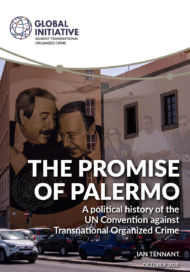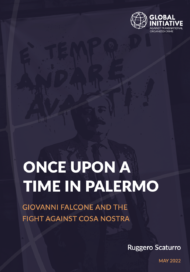Posted on 19 Apr 2024
On 5 April 2024, the third Constructive Dialogue on Firearms for the Review Mechanism of the UN Convention against Transnational Organized Crime (UNTOC) was held in Vienna. The meeting included updates on the ongoing delays in the review mechanism, insights from civil society participants and the introduction of a planned civil society declaration on the implementation of the UNTOC.
The constructive dialogues have been convened since the launch of the UNTOC’s review mechanism in 2020 to exchange perspectives between government and non-governmental stakeholders on the implementation of the convention. Although they are allowed to participate in the dialogues, after many years of negotiating the modalities of the review mechanism, NGOs are still not permitted to attend the official UNTOC ‘working groups’, where states discuss implementation behind closed doors. However, despite the lack of access to the official process, 144 participants from civil society registered to attend the public meeting.
In his opening remarks at the dialogues, the chair of the meeting, the newly appointed permanent representative of Mexico in Vienna, noted that the success of the convention depends not only on the responsibility of states, but also on the involvement of society as a whole. He stated that civil society has a crucial role to play and therefore its assessment and contributions should be highly valued.
Following the two previous constructive dialogues on firearms, progress on the developments and outcomes of the UNTOC review mechanism seemed to continue to proceed at a slow pace. Currently, only 73 country reviews (or 38.6 per cent of the 189 countries under review) are progressing in the first thematic cluster (out of four), while the rest have not yet officially started due to the lack of preliminary consultations. Three clusters should have been completed by now, while all the others should currently be underway. To say that the mechanism is behind schedule would therefore be a gross understatement.
This delay has been exacerbated by a number of challenges, including a lack of designated government focal points, insufficient action by states, countries participating in different languages and technical difficulties. The contribution of civil society organizations is crucial to filling this gap. Some positive news in this regard is that several countries, including Belgium, Canada, Switzerland, France and the United States, have included consultations with civil society organizations as part of the process of completing their self-assessment questionnaire.
Insights from civil society participants
Despite the challenges in access and lack of data from the review mechanism, civil society organizations once again made valuable contributions to the constructive dialogue through two panels. The panels are composed of non-governmental stakeholders who address and take questions from states and other non-state actors on pre-agreed topics.
The first panel discussed the implementation of the UN Firearms Protocol in view of technological developments related to the illicit manufacture of and trafficking in firearms. Bailey Henwood of the NGO Conflict Armament Research said that they have developed standard methods for recovering markings and tracing the manufacture of privately produced firearms, but that the emergence of 3D printing technology poses a serious threat by disrupting traditional supply chains and complicating efforts to trace firearms. Natalia Pollachi of the Instituto Sou da Paz highlighted the growing advantage of legal loopholes and deregulation for criminal organizations. And Johnson Asante-Twum, of the International Action Network on Small Arms, recommended that states prioritize the review and strengthening of their legislation, enhance international cooperation, and create a platform for sharing experiences and best practices among civil society organizations and international bodies to address the evolving challenges.
The second panel focused on the Firearms Protocol’s criminalization article. Mitzi Austero, from the NGO Nonviolence International Southeast Asia, noted that strengthening victim assistance initiatives through data collection could improve effectiveness, that sharing best practices among member states could prove beneficial, that civil society is key to addressing gaps in health and education, and that linkages with stakeholders need to be strengthened. Similarly, Kathi Austin of the Conflict Awareness Project said that implementation efforts are essential and that working with prosecutors has proven valuable. Guillermo Vázquez del Mercado, representing the Programme for the Study of Violence of the Mexican Centro de Investigación y Docencia Económicas, discussed how the enforcement of offences under the Protocol can help combat organized crime, and recommended reducing the diversity and lethality of firearms, and improving and standardizing legal mechanisms to stem the flow of illicit firearms, ammunition and their parts. Finally, León Castellanos-Jankiewicz of the Asser Institute discussed access to justice and the need for different regions to better understand their role in global flows and impacts, highlighting that, although other regions may have experienced more mass shootings, Europe has a major global impact, as it is the home to six of the top arms exporters.
A delegate from the Mexican government then spoke about the stigma attached to countries more clearly associated with firearms trafficking, rather than the countries from which these weapons are exported. The Sudanese delegate also took the opportunity to highlight the role of states in the illicit arms trade, accusing the government of the United Arab Emirates of sending illegal arms to Sudan.
The Global Initiative Against Transnational Organized Crime (GI-TOC) submitted a written statement that included data from its 2023 Global Organized Crime Index, explaining why the spread of weapons from current conflicts has so far been limited due to acute political attention and a lack of clear financial incentives in these conflicts (although high risks remain), and how increased access to firearms shapes the way organized crime networks operate and fuels other forms of crime. The 2023 Index ranks arms trafficking as the fourth most prevalent criminal market in the world, and its global reach has increased since the last iteration of the Index in 2021. This is largely due to the spillover of weapons from conflict zones: in regions experiencing instability, where arms caches have been supplying weapons to insurgents and organized crime for decades, the global illicit arms trade has increased by 0.29 points since 2021. Because firearms trafficking thrives in both conflict and non-conflict zones, the illicit firearms trade poses a core threat to sustainable development, peace and security the world over.
Next steps
The Alliance of NGOs on Crime Prevention and Criminal Justice – the umbrella body for civil society engagement on crime and justice issues at the UN – made a statement introducing a civil society declaration on the implementation of the UNTOC. This is intended as a vehicle to communicate civil society’s perspectives and concerns to member states and the wider public, and was a follow-up to civil society discussions at last year’s constructive dialogue. The declaration will be submitted to the 12th UNTOC Conference of Parties in 2024.
As the meeting’s chair observed in his opening remarks, the success of the UNTOC depends on the involvement of both states and civil society. While the UNTOC review mechanism continues to move at a slow pace, the fact that a growing number of states have completed their self-assessment questionnaires by including input from civil society organizations brings a glimmer of hope. Civil society’s broader efforts to coordinate their engagement globally will help to ensure that their contributions are heard at the national level and in future constructive dialogues.
The next constructive dialogue, due to take place in June 2024, will address technical assistance and international cooperation. The panel discussions will focus on the criminalization of environmental crime, organized fraud and the impact of technology on international cooperation in criminal matters. The GI-TOC intends to contribute further research and analysis during this session.



